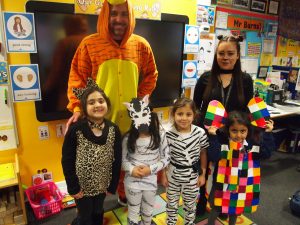Poetry Week
This year’s theme was ‘Resilience and Courage’. Take a look at the video where you can see all of this year’s winners. The children worked extremely hard to showcase performing with resilience and courage, as well as writing poems based on resilience and courage. We are so very proud of all the children and in awe by the content they produced! We look forward to next year’s poetry week!
Sponsored ‘Readathon’
In celebration of World Book Day, Avanti House Primary children were invited to take part in a ‘Readathon’. They were asked to read as much as possible for 2 weeks and ask people them to sponsor them for reading. Many children across the school took part and we raised a total of £1450 which we will now spend on books for our classrooms!
Well done to Mia Patel from Reception Laughing Ladybirds for raising a total of £301!
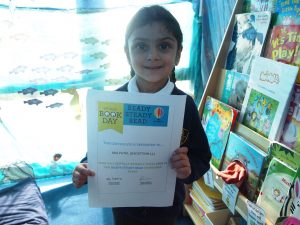
Mia Patel, Reception LL
World Book Day
Avanti House Primary School children celebrated World Book Day. Children used their creativity to create their own Eco-friendly costumes based on their key text. Prior to WBD, children created puppets for the characters of their key text and used these to perform puppet shows for their class. Year 4 performed a fantastic puppet show to the entire school!
All children took part in paired reading with older/younger children. “I really enjoyed reading with Reception pupils because we don’t get to spend much time with the younger children. We could explain words and help them read books properly. It was such a nice experience.” (Hemi Bhatt Year 4 HH). World Book Day was indeed a memorable day for all our children! We would like to thank all the parents/carers who supported children with their creative costume making and for encouraging your child to take part in all activities.
Here are some quotes by children about WBD:
I think the best part of the day was when we got to read with a class because that really boosted my confidence. (Halle Year 3GG)
The best part of world book day was when we got to make our own puppets based on Charlotte’s web. (Dhruv Year 3GG)
Reading with the little children was fun because we got to see their outfits and we read together. Also, I made a new little friend that day! (Aryan Vekaria Year 4 RR)
I really enjoyed the puppet shows because it gives us a chance to summarise the story in a fun way (Mehek Year 4 HH).
I liked the part where we had to think about who has the most eco-friendly costume because it looks to global warming and recycling (Aashi Year 4 HH)
My favourite part was when we did the puppet show. (Bella Year 1 DD)
My favourite part was seeing everyone’s eco-friendly costumes because we didn’t but it, we got to make it ourselves. (Parshvi Year 1)
We were making puppets with socks and we did puppet shows! (Sneh Year 1TT)
I liked the puppet show and I liked reading with the big kids. (Dhriti Reception BB)
I liked the voting because I got a certificate. (Aanushi Reception BB)
I liked making stories with the sock puppets. (Ameya Reception LL)
I liked playing the quizzes because it had lots of questions. (Krupa Year 2PP)
I liked WBD because we got to do different things. (Leeya Year 2PP)
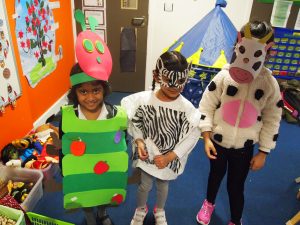
Book Corner Competition Winner: Year 1 TT!
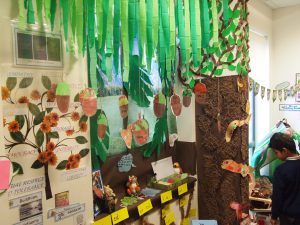
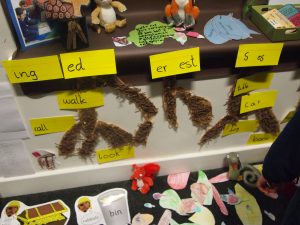
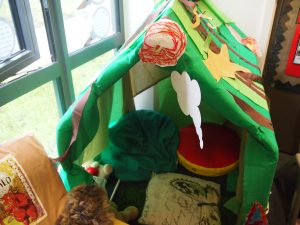
Year 1 TT worked together to create an inviting, vibrant book corner based on their key text, “The Gruffalo” by Julia Donaldson.
Many other classes also worked hard to create a stimulating book corner for their classes. Have a look at the images below!
Reception Busy Bees
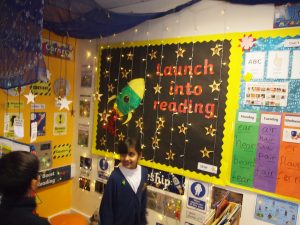
Year 2 Fabulous Flamingos
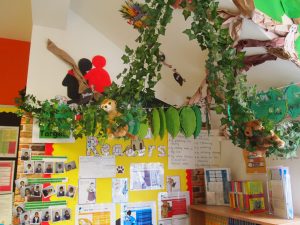
Year 2 Precious Peacocks
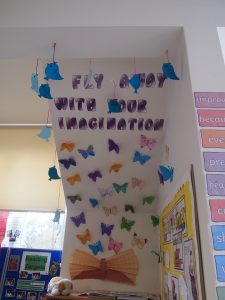
Year 3 Gentle Giraffes
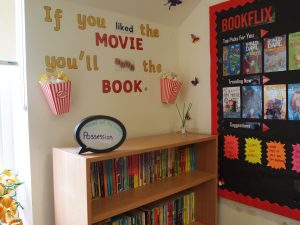
Year 3 Kind Kangaroos
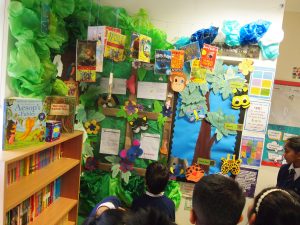
Year 4 Respectful Rhinos
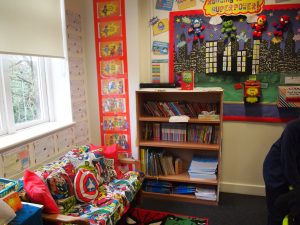
Our Fabulous Whole-School Story Book
To celebrate World Book Day at Avanti House Primary children took part in a variety of exciting activities. One of the most enjoyable activities was to write a whole-school story book as a whole class. The story was initiated in Reception classes who set the scene and then gave their first part of the story to Year 1 and so forth. Every class got an opportunity to read what the children before them had written and to then continue the story using their own imaginative and creative ideas.
Once the children had written their story as whole-school, they were asked to create illustrations for their part of the story. A few illustrations were chosen from each class and have been included in the whole-school story eBook (see below).
Please click on the link below to read our entire story!
Whole School Story eBook
The ABC’s of Reading
A look at the Primary phase reading strategy
The Avanti House Reading Strategy takes into account the Government’s expectation that all children should leave primary school able to decode words and have a ‘love of reading’. We have devised a strategy to build on synthetic phonics as one effective approach to develop children’s reading but also draw from an Australian research project which culminated in a programme called First Steps. This presents reading behaviours and attitudes in a less linear way and shows how in different phases there are different and complex processes involved in understanding how to read and the meaning behind reading.
| PRIMARY PHASE READING STRATEGY | |||
| PHONICS | GUIDED READING (DIRECT TEACHING OF READING) | READING FOR PLEASURE | SUPPORTING EMERGING READERS
STRETCHING CONFIDENT READERS |
| • Letters and sounds (Reception to Year 2)
• Daily reading (Volunteers & TAs) • Daily synthetic phonics sessions from Reception to Year 2 |
• Learn to read (focus is on learning to read for meaning and develop children’s comprehension)
• Phonics Bug Reading Scheme (home readers levelled books) |
• Annual Book Week
• Annual Shakespeare Week • High quality book corners in every class room • High quality library in each school with wide selection of books, including multimedia texts • Books chosen by children and taken home weekly • Home Reading Record/parent training • Book bags for every child |
• Identified children/new starters/ EAL and SEN focused support using Reading Recovery
• Reading Support (group reading programme) • Bespoke interventions including comprehension, challenging readers clubs etc (e.g. the Head Teacher will run lunch club to extend reading skills) |
| ATTITUDES TO READING * | ||||
| PHASE 1 | PHASE 2 | PHASE 3 | PHASE 4 | PHASE 5 |
| PHONICS | GUIDED READING (DIRECT TEACHING OF READING) | READING FOR PLEASURE | SUPPORTING EMERGING READERS | READING FOR PLEASURE |
| • Curiosity about printing and mark making
• Wants to look at books • Points at text, has a go • Expresses enjoyment • Eagerly anticipates book-reading • Plays out characters in stories |
• Talks about their own reading
• Asks for favourite stories to be read • Joins in and acts out stories • Selects books to read for pleasure |
• Has a go at reading own words
• Enjoys listening to stories • Reads for a range of purposes (pleasure & information) • Responds sensitively to stories • Discusses favourite books, authors • Selects own reading material according to interest • Reconstructs information gained |
• Self-motivated to read
• Reads for range of purposes • Responds sensitively • Discusses favourite books, authors, particular genres • Makes comparisons with other texts • Confidence to read a wide selection of texts • Reads alone for prolonged periods of time |
• Avidly pursues a favourite author, books compared and recommended
• Feels strongly about reading preferences • Totally absorbed when reading & reads for long periods at home and at school • Sees books and text as a major source of information • Strongly relates to characters in fiction |
* Phases drawn from Indicators for Reading Development Continuum, First Steps
| WEEKLY READING LEARNING AND TEACHING | ||||
| TAUGHT PHONICS | GUIDED READING (DIRECT TEACHING) OF READING) | READING FOR PLEASURE | ALL TEACHING SESSIONS | SUPPORTING EMERGING & STRUGGLING READERS
STRETCHING CONFIDENT READERS |
| • ½ hour Phonics session taught in whole group session. This is using Phonics Bug scheme which is based on Governments agreed Letters and Sounds strategy. As children progress at different rates, children will be supported in catch up groups. The main teaching is as whole class however (Teachers and TAs trained in Phonics)
• Repetition & consolidation activities planned for during free-flow and independent activities. |
• Twice-weekly guided reading sessions taught by the class teacher.
• Phonics Bug Reading Scheme (home readers levelled books) • Teaching assistants will change children’s phonics reading books weekly. Children read their phonics levelled book to the TA/adult, who assesses confidence and identifies another book to support phonic learning or moves child to next level. (Led by TAs under Teacher’s supervision) |
• As well as Phonics Levelled books, books chosen by children and can be taken home every day
• Book bags for every child • Home Reading Record to record reading experience at school and at home. • Story time each day for children during which teacher and other adults share their joy of reading. High quality texts with opportunities for children to read, act out, sing and listen. |
• Will provide opportunities for children to read. Text on IWB. Children invited to read along.
• Key Vocab on display and used throughout sessions • Literacy Learning Wall identifies focused language. Referred to by adults and children. • Teaching demonstrates the excitement of stories and the importance of finding out information • Everyone is celebrated as a reader. Adults are vigilant to identify how children have been successful in their reading development. |
• Identified children/new starters/ EAL and SEN and G&T focused support
• Reading Recovery |
| ASSESSING PHONICS AND READING | ||||
| TAUGHT PHONICS | GUIDED READING (DIRECT TEACHING) OF READING) | READING FOR PLEASURE | ALL TEACHING SESSIONS | SUPPORTING EMERGING & STRUGGLING READERS |
| • Phonics Tests
• Sight Word tests • Assessment informs groupings for Phonics sessions (particularly in later phases) |
• Guided Reading assessment format completed and children tracked
• Running Record |
• Home Records show daily reading at home
• They identify children’s enjoyment of texts • Finding the ‘buzz’ in literacy sessions |
• Lesson monitoring
• Shared best practice • Learning Walls discussed by children – direct impact on children’s learning |
• Tracking children
• Reading record completed after each session to inform planning and teaching |
List of Recommended books:
Please click on the links below to download the recommened books for reading.
Recommended Reading Books for Year 1
Recommended Reading Books for Year 2
Recommended Reading Books for Year 3
Recommended Reading Books for Year 4
Recommended Reading Books for Year 5


